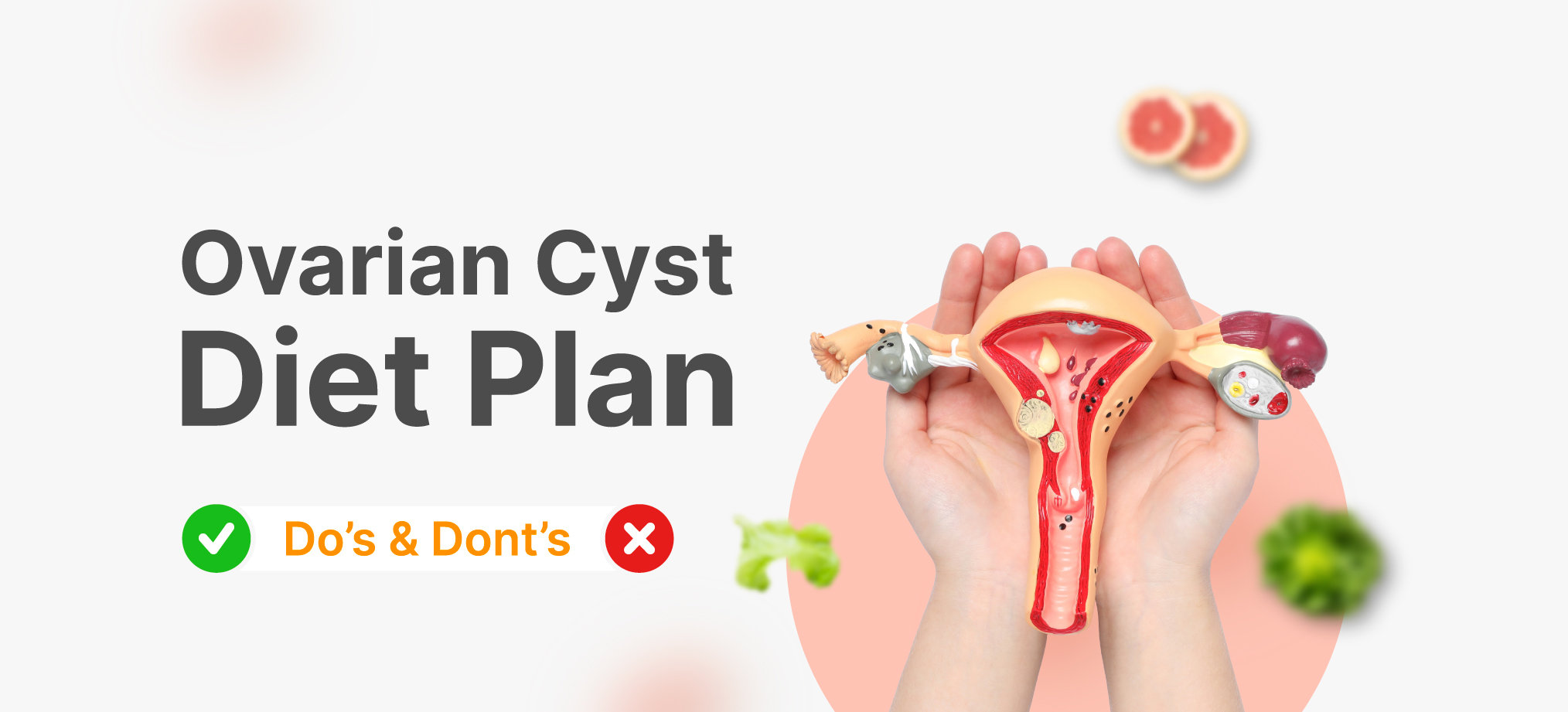- Home
- Blog
- Women Care
PCOS Diet Plan and Exercises to Lose Weight
Women Care
PCOS Diet Plan and Exercises to Lose Weight
By Apollo 24|7, Published on- 17 August 2022, Updated on -23 February 2023
Share this article
0
6 likes

According to research, polycystic ovary syndrome [PCOS] affects 4%-20% of all women of reproductive age worldwide. Those suffering from PCOS can find it quite difficult to lose weight. There is an age-old myth that refers to PCOS as the lazy-girl syndrome, which results from excessive weight. But, that is all it is - a myth!
Weight gain is actually a symptom of PCOS and the constant lethargy hounding those with this condition makes it immensely difficult for them to lose weight. This blog underlines the best diet plans, exercises and tips for losing weight with PCOS and reversing the condition naturally.
However, those of you who have been dealing with PCOS for a long while and do not find medicines to be very helpful should consult the best gynaecologist right away. A specialised doctor can help you reverse PCOS by precisely addressing the problem’s root cause.
PCOS Diet Plan To Lose Weight: What to Eat?
People suffering from PCOS have insulin levels higher than normal. Since insulin is a hormone responsible for turning sugar into energy, low insulin levels can result in increased blood sugar levels. This can also occur in case you have insulin resistance, which means that your body is unable to effectively use the insulin produced.
The body of those with insulin resistance often tries to produce more and more insulin to maintain normal blood sugar levels. These higher than normal levels of insulin in women can cause their ovaries to produce more androgens, such as testosterone. A diet rich in refined carbohydrates, such as sugary and starchy foods, can promote insulin resistance and make weight loss more difficult to manage.
When coming up with a PCOS diet plan to lose weight, there are certain foods you should definitely include in your diet such as:
1. Foods Loaded with Fibre
As fibre makes you feel full after a meal, a diet rich in fibre can prove to be helpful in promoting weight loss in women with PCOS. According to a study, higher fibre intake was associated with lower insulin resistance, belly fat and total body fat in women suffering from this condition. Some of the common foods for PCOS treatment include:
- Cruciferous vegetables like cauliflower, broccoli and Brussels sprouts
- Green and red peppers
- Greens like arugula and red leaf lettuce
- Beans and lentils
- Berries
- Almonds
- Sweet potatoes
- Pumpkin
- Winter squash
2. Lean Protein Sources
Protein helps in stabilising your blood sugar and increasing the feeling of fullness after your meal. It also supports weight loss by reducing cravings, managing hunger hormones and helping you burn more calories. Rich sources of lean protein like chicken, tofu and fish, can prove to be highly nutritious and fulfilling foods for PCOS treatment.
3. Anti-inflammatory Foods
Chronic inflammation is quite common in women suffering from PCOS and is linked to obesity. A carefully crafted diet rich in fruits, vegetables, olive oil, whole grains and omega-3-packed foods like fatty fish can protect you against inflammation and help you lose weight with PCOS. Some foods that can be helpful in reducing inflammation include:
- Kale
- Tomatoes
- Spinach
- Walnuts and almonds
- Olive oil
- Fatty fish loaded with omega-3 fatty acids like sardines and salmon
- Fruits like strawberries and blueberries
You can consult our best dietician to know more about what exactly to eat in PCOS to reduce weight.
PCOS Diet Plan To Lose Weight: What Not to Eat?
While preparing your PCOS diet plan to lose weight, the following are some of the foods to avoid with PCOS:
1. Foods Rich in Carbohydrates
Carbohydrates can cause inflammation and exacerbate insulin resistance. For this reason, lowering your carb intake can help in managing PCOS and losing weight. So, for women with PCOS, it is wise to avoid foods rich in refined carbohydrates, including highly processed foods such as:
- White bread
- Breakfast pastries
- Muffins
- Sugary desserts
- Anything made with white flour
2. Sugary and Processed Foods
Avoiding certain unhealthy foods is highly recommended for women suffering from PCOS and looking to shed extra pounds. Processed foods and items with added sugars can increase your risk of insulin resistance and raise blood sugar levels. Women with PCOS should limit their consumption of such foods to maintain healthy body weight and manage their symptoms.
3. Inflammatory Foods
As mentioned above, women with PCOS often show signs of chronic inflammation, which is linked to obesity. To lose weight, women with PCOS should avoid consuming inflammation-causing foods such as margarine, fries, and red or processed meats.
Watch this video by Dr. Mithee Bhanot, Sr. Gynaecologist with Apollo 24|7, to know more about myths around PCOS and how to manage it.
Tips to Make Your PCOS Treatment Diet Most Effective
While making and sticking to a proper PCOS diet plan to lose weight can be quite beneficial for women suffering from this condition, there are several ways through which you can make it even more effective. Following are some helpful tips for making your PCOS treatment diet the most effective
1. Practice Mindful Eating
According to research, women with PCOS are more prone to developing eating disorders. One of the potential solutions to this problem as well as improving the effectiveness of your diet is to practice mindful eating. It not only creates an increased awareness of bodily cues like fullness and hunger but also helps address problematic eating behaviours like stress eating and binge eating.
2. Avoid Undereating
Restricting calories in the long term can slow down your metabolism and can eventually lead to weight gain. Moreover, a significant decrease in your calorie intake can adversely affect the hormones that control your appetite. It is highly advisable that you focus on eating healthy foods and cutting out unhealthy products from your diet instead of restricting calories and undereating.
3. Consider Supplements
In women with PCOS, several supplements can help in managing weight and symptoms when taken regularly. These supplements can prove to be quite helpful in supporting your PCOS treatment diet and helping you lose weight. However, it is highly advisable to consult with an experienced doctor before deciding to take any supplement on a regular basis.
PCOS Exercises to Lose Weight
Regular exercise has always been a highly recommended way of losing weight. Following are some of the most effective and beneficial types of exercises for PCOS treatment and weight management.
1. Cardio Workouts
Cardio exercises like jogging, cycling, swimming and brisk walking can be quite helpful in losing weight with PCOS. These exercises increase your body's sensitivity to insulin, which can not only prevent diabetes and obesity but also many other diseases.
2. HIIT Workouts
HIIT workouts involve swapping between short bouts of high- and low-intensity exercises in uniform intervals. These workouts can be quite effective in losing weight, burning belly fat, improving insulin resistance and reducing excess testosterone.
3. Yoga
Studies show that women suffering from PCOS have an enhanced physical response to stress, which can easily result in weight gain. Yoga, among other mind-body exercises like tai chi and pilates, can not only burn calories but also help manage stress levels to prevent your PCOS symptoms from worsening.
Eating healthy and exercising regularly is the best way of losing weight, especially for women with PCOS. For the best results, consult with an Apollo doctor to come up with a workout routine and diet plan to lose weight with PCOS.
Click HERE to know how to manage PCOS with Diet and Exercise.
Frequently Asked Questions on PCOS
1. Can PCOS be cured?
No. As yet, there is no definite cure for PCOS. However, you can certainly manage the symptoms with the help of a proper diet plan, consistent exercise routine and medication.
2. Can I get pregnant with PCOS?
Yes, you can get pregnant with PCOS. While PCOS can make it harder for women to get pregnant, it does not prevent the chances of pregnancy altogether. Consult with India’s best gynaecologists for successful pregnancy along with PCOS through Apollo 247 and speak to an expert in less than 15 minutes!
3. Does female masturbation cause PCOS?
No, the practice of masturbation does not contribute at all to your chances of developing PCOS in any way.
4. What does a PCOS belly look like?
PCOS leads to the accumulation of visceral fat around your belly and the abdomen is usually hard. A high waist-to-hip ratio is a common indicator of a PCOS belly. Women with PCOS may also have increased hair on their bellies. Additionally, PCOS may make your belly feel bloated very often. In some cases, the bloating can also be painful.
5. Who can get PCOS?
Any woman who has already gone through puberty can get PCOS. Most women are diagnosed in their 20s or 30s when they are trying to get pregnant. Those who have obesity, are overweight or are related to someone with this condition have a higher chance of getting PCOS.
To avail the best PCOS treatment click the below button.
Consult with Best Obstetrician & Gynaecologist
- Medically Reviewed By Dr. Dhanunjay Reddy B
Services
Women Care
Leave Comment
Services
Recommended for you

Women Care
Ensuring Safe Motherhood: How To Take Care Of Pregnant Women?
Pregnant women need a proper diet, adequate exercise, and the right supplements to ensure complete wellbeing. Read on to know more about pregnancy dos and don'ts.

Women Care
Ovarian Cyst Diet: What to Eat and Avoid in Ovarian Cysts?
Many women may develop an ovarian cyst at some point in their lives. Although the cysts are painless and cause no life-threatening symptoms, they should not be ignored. With the help of the ovarian cyst diet plan, you will know what you should eat when suffering from an ovarian cyst.

Women Care
Having Irregular Periods? These Can Be the Problems!
One of the most common forms of menstrual problems is irregular periods. While more often than not, experiencing irregular periods on occasion is not a huge cause for concern, it's still a good idea to see a gynaecologist to know if there is a deeper underlying cause. This blog shares the major reasons behind irregular periods.
Subscribe
Sign up for our free Health Library Daily Newsletter
Get doctor-approved health tips, news, and more.

